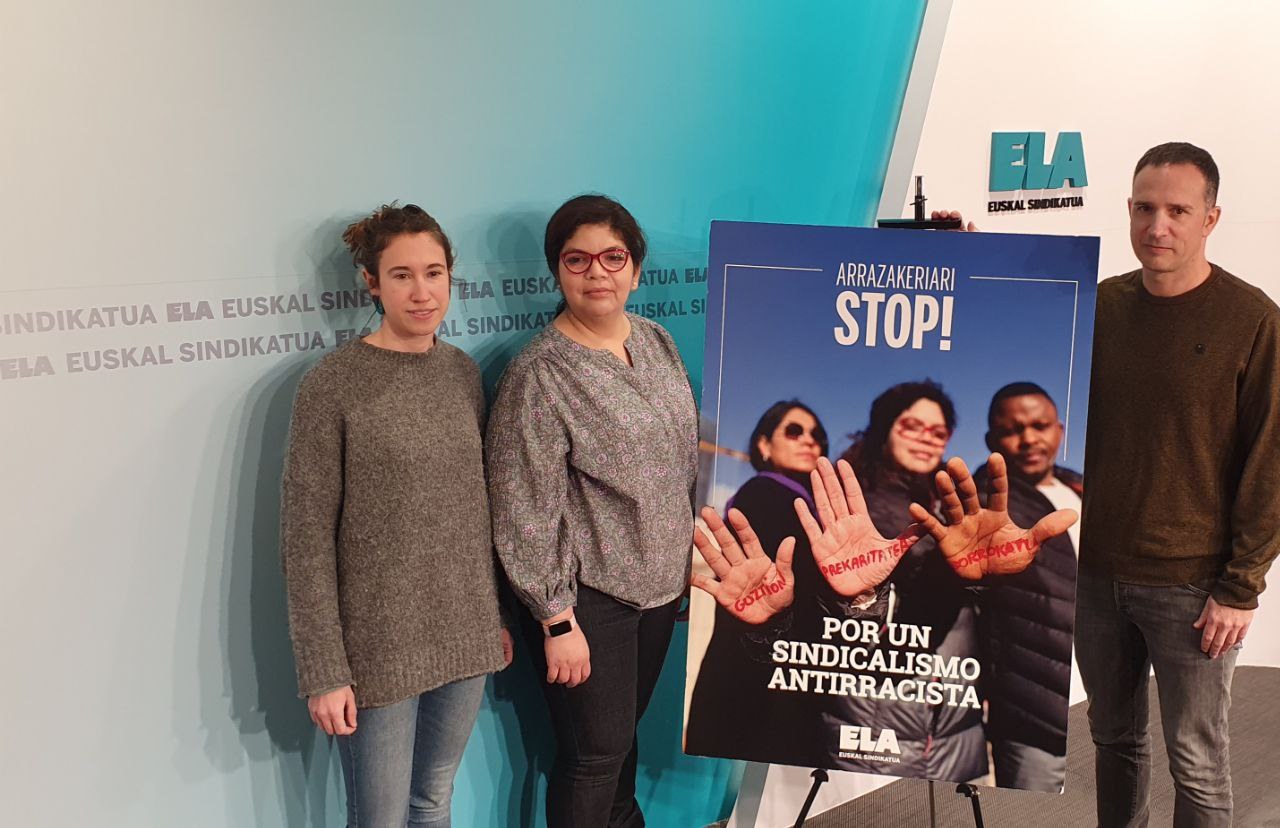ELA is launching a campaign to mobilise over 1,500 trade union sections in the fight against racism and discrimination

Mitxel Lakuntza (General Secretary of ELA) took part in the press conference, as a follow up to the event held between Irun and Hendaia on the 20th of March (the eve of the International Day for the Elimination of Racial Discrimination): “There are some companies that deliberately hire immigrants to be able to make the working conditions even more insecure and increase their profit margins, while knowing that this group of people have even greater needs.
Migrants form part of this more insecure or submerged labour market, where in addition to the irregularity of the work, at times these immigrant workers also suffer from semi-slavery conditions. Organising these immigrant workers is part of the trade union’s work. The trade union fight needs these people, because they are part of the working class and with their driving force, we are stronger as a class.”
Leire Gallego (Head of Social Action at ELA) recalled that “there is a constant violation of the rights of migrants: access to housing, social aid, etc. As the Basque Government has just acknowledged, eight out of every ten homeless people in the ACBC (Autonomous Community of Basque Country) are foreigners. The structural difficulty to access housing becomes worse in the case of migrants.” Likewise, in order collect social benefits such as the RGI (Income Guarantee Benefit) in the ACBC or the Guaranteed Income in Nafarroa 3 and 2 years of census registration are required respectively, which perpetuates the poverty suffered by this group. Access to public employment is also banned for most migrants, and in the field of education, they are the victims of a segregating system.
The report presented by ELA reflects a highly discriminatory reality. The employment data, for example is very serious. Migrants suffer job insecurity to a much higher degree:
Temporary work: If the general average is 21%, in the case of migrants, this rate rises to 26.4% in the ACBC and to 57% in Navarra.
Part-time work: 26.9% of migrants in the ACBC are in this situation (this figure rises to 43.8% in the case of women), as well as 21% in Navarra. The rates are 50% above the average of the general working population.
The wage gap: Foreigners’ wages are 45.3% lower than that earned by people born in the region. The gap between the two groups was 12,625 euros in the year 2021, the last year with data.
As an example of this reality, Miriam Ruiz Hernández (ELA delegate at the company Limpiezas Abando) also took part in the press conference, declaring that the racism suffered by migrants when they arrive is structural: “The levels of poverty amongst migrants are 5 times higher than amongst non-migrants.”
As was underscored by Mitxel Lakuntza and Leire Gallego, “ELA is committed to being an anti-racist trade union. This calls for action in the work centres. We are fighting against job insecurity that is streaked with elements such as gender or race. In recent years we have managed to organise ourselves and fight against job insecurity in many work centres where the amount of migrant workers is very high,” and they gave examples such as Cecosa, NH Hotels and Barceló, Navarpluma, Ferrovial, etc. The main point of the campaign will be to materialise this commitment in hundreds of work centres through ELA’s trade union sections, with the aim of mobilising the membership in the fight against racism in the world of work, improving the detection of discriminations in the companies in Hego Euskal Herria, and increasing the effectiveness of the trade union fight against job insecurity.
These actions will be integrated in the everyday trade union work, aimed at eliminating the wage gaps suffered by migrants, as well as the other insecure conditions that they suffer from due to the fact that they belong to one of the most vulnerable groups in the world of work. In short, to extend the previously mentioned achievements to the entire Basque workforce.
Some of ELA’s demands are the following:
- To backtrack in the signing of the European Migration and Asylum Pact.
- The dismantling of the Frontex agency.
- Putting the fulfilment of human, economic, social and cultural rights above those of the companies and the capital – No to the Free Trade Treaties. Defence of the People’s Treaty.
- Repeal of the Spanish Immigration Law.
- The administrative regularisation of all people, guaranteeing census registration.
- Guaranteeing everyone the same rights, without any discrimination due to origin and/or race.
- Full competence on the subject of migration for the institutions of Hego Euskal Herria.
- On the subject of labour, increasing the Work Inspection resources in order for irregularities and cases of labour exploitation to be detected.
- Training resources for migrants (digital gap, Basque language, etc.).
